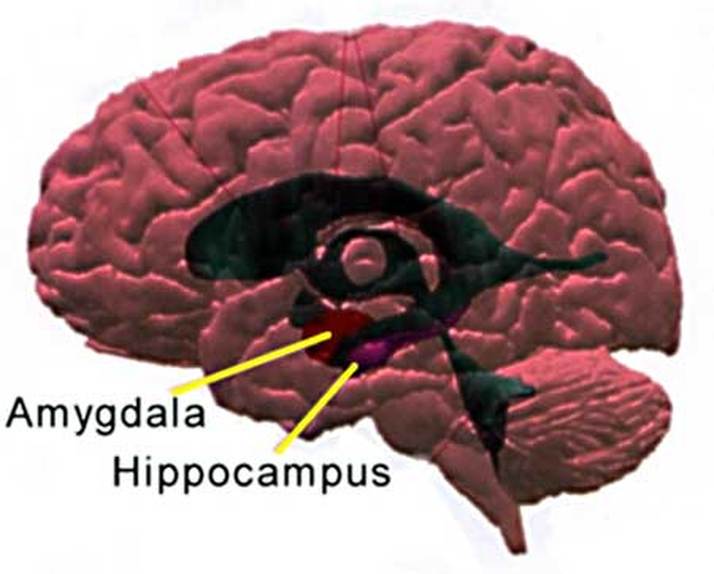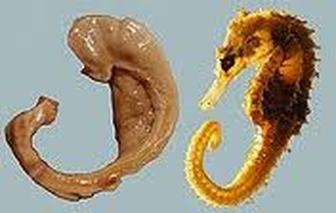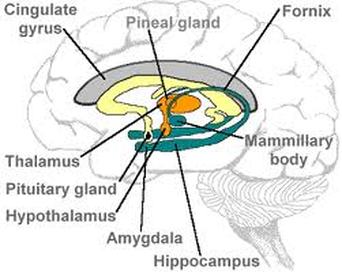Even High Normal Sugar is Bad for Your Brain ( especially your seahorse and your almond )
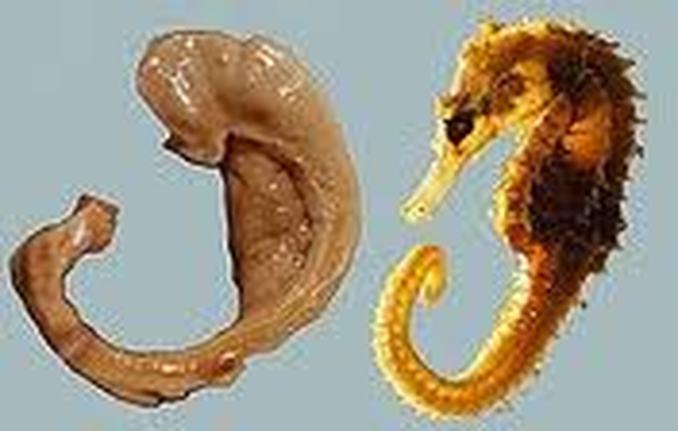
September 5, 2012 — Even blood glucose levels in the range of high normal appear to be associated with brain atrophy.
Especially in two parts of the brain. The Hippocampus ( Greek for "sea horse") and the Amygdala ( Greek for "almond".)
The seahorse affects memory. The almond affects moods.
The World Health Organization uses 6.1 mmol/L as the cutoff for normal blood glucose. The American Diabetes Association uses the more stringent threshold of 5.6 mmol/L.
In a recent study, brain atrophy was seen at both levels. (B.C. uses 5.5, so even if your sugars are at 5.5 or slightly below your brain could be suffering for it. You might starting have a hard time remembering things. And you also might have a hard time remembering things.
The rate of hippocampal atrophy was 2% per annum, and plasma glucose effects accounted for 6% to 10% of atrophy, the authors note.
In other words, your brain fades away at 2% a year, and a tenth of that fading can be due to high blood sugar. Even high normal.
Possible Mechanisms
High blood glucose levels can affect the brain through various mechanisms, perhaps the most likely being fallout from inflammatory processes.
Higher glucose levels trigger an anti-inflammatory cascade. We know this is not good for the brain, and particularly [is] not good for the hippocampus, which is sensitive to environmental stresses, whether inside the body or coming from outside.
Another possible mechanism is abnormal blood coagulation. High glucose levels may lead to abnormal coagulation, thereby increasing the likelihood of thrombosis, microemboli, and clinical and subclinical strokes, which are risk factors for brain aging.
Psychological stress could be another culprit. Stress is associated with increased activation of the hypothalamic-pituitary-adrenal (HPA) axis, and this activation has been linked to increased glucose levels.
So the final message is that even high normal blood glucose levels can leave you dumb and grumpy. Rats !
Neurology. 2012;79:1019-1026. Abstract
Especially in two parts of the brain. The Hippocampus ( Greek for "sea horse") and the Amygdala ( Greek for "almond".)
The seahorse affects memory. The almond affects moods.
The World Health Organization uses 6.1 mmol/L as the cutoff for normal blood glucose. The American Diabetes Association uses the more stringent threshold of 5.6 mmol/L.
In a recent study, brain atrophy was seen at both levels. (B.C. uses 5.5, so even if your sugars are at 5.5 or slightly below your brain could be suffering for it. You might starting have a hard time remembering things. And you also might have a hard time remembering things.
The rate of hippocampal atrophy was 2% per annum, and plasma glucose effects accounted for 6% to 10% of atrophy, the authors note.
In other words, your brain fades away at 2% a year, and a tenth of that fading can be due to high blood sugar. Even high normal.
Possible Mechanisms
High blood glucose levels can affect the brain through various mechanisms, perhaps the most likely being fallout from inflammatory processes.
Higher glucose levels trigger an anti-inflammatory cascade. We know this is not good for the brain, and particularly [is] not good for the hippocampus, which is sensitive to environmental stresses, whether inside the body or coming from outside.
Another possible mechanism is abnormal blood coagulation. High glucose levels may lead to abnormal coagulation, thereby increasing the likelihood of thrombosis, microemboli, and clinical and subclinical strokes, which are risk factors for brain aging.
Psychological stress could be another culprit. Stress is associated with increased activation of the hypothalamic-pituitary-adrenal (HPA) axis, and this activation has been linked to increased glucose levels.
So the final message is that even high normal blood glucose levels can leave you dumb and grumpy. Rats !
Neurology. 2012;79:1019-1026. Abstract
Interesting facts about the hippocampus
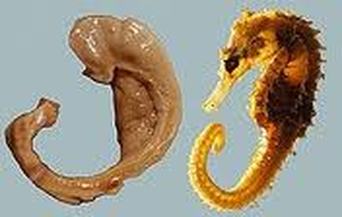
The hippocampus is involved in memory . And you can make it bigger by giving it a work out.
The best kind of workout is a memory challenge. So researchers got an idea.
Bus drivers in London drive the same route over and over every day. Not much memory required.
But taxi drivers in London have to keep track of a huge disorganized metropolitan city that evolved over hundreds of years, mostly by accident. A huge memory challenge.
So who do you think had the bigger seahorses ???
Yup, it was the cab drivers, consistently, as shown on CT scans.
So if you want to keep your hippocampus healthy, learn huge complicated intricate bits of knowledge. And keep updating it regularly.
That is part of the reason I practice medicine, and why I still keep trying to add new stuff to the mass confusion already present in my mind from nearly thirty years of medical studies.
My seahorse needs me to keep giving it regular workouts !
The best kind of workout is a memory challenge. So researchers got an idea.
Bus drivers in London drive the same route over and over every day. Not much memory required.
But taxi drivers in London have to keep track of a huge disorganized metropolitan city that evolved over hundreds of years, mostly by accident. A huge memory challenge.
So who do you think had the bigger seahorses ???
Yup, it was the cab drivers, consistently, as shown on CT scans.
So if you want to keep your hippocampus healthy, learn huge complicated intricate bits of knowledge. And keep updating it regularly.
That is part of the reason I practice medicine, and why I still keep trying to add new stuff to the mass confusion already present in my mind from nearly thirty years of medical studies.
My seahorse needs me to keep giving it regular workouts !
